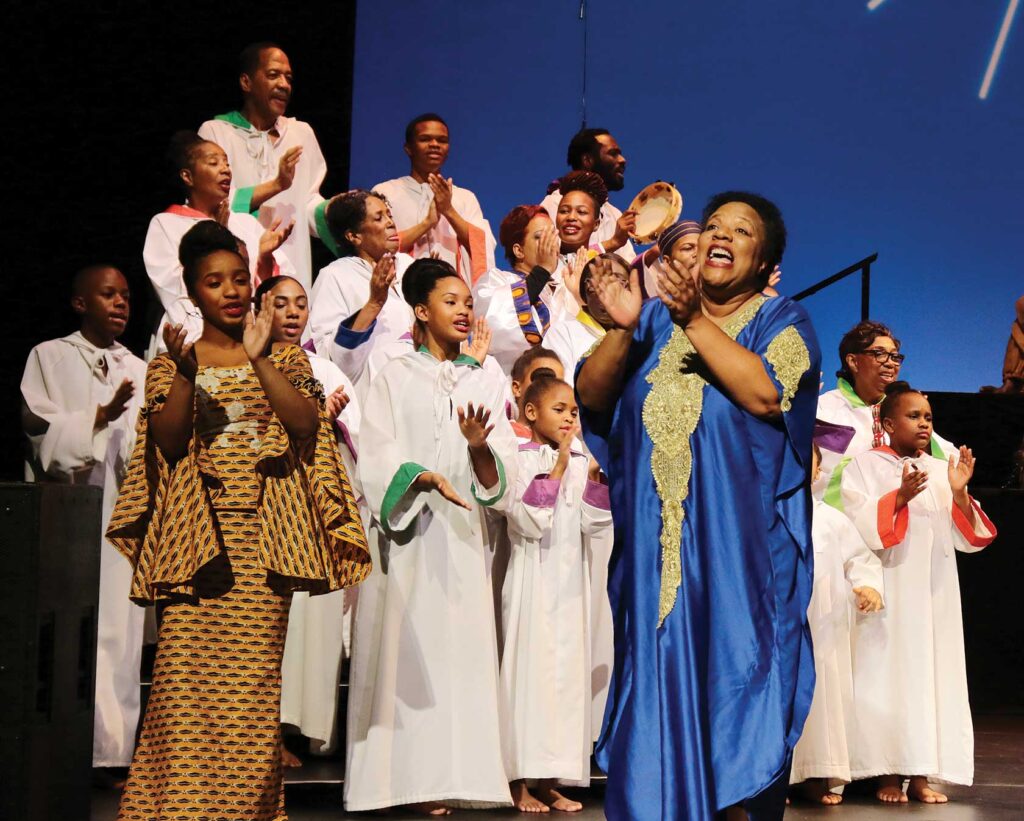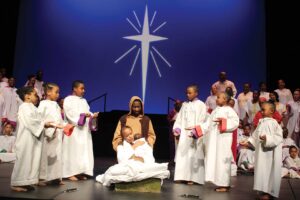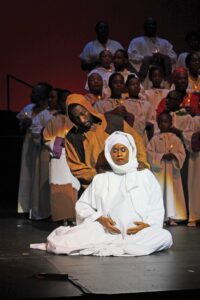
Banner Arts & Culture Sponsored by Cruz Companies
For over half a century, the National Center of Afro-American Artists has presented a production of “Black Nativity,” inviting audiences into a musical take on the classic story of the birth of Jesus Christ based on Langston Hughes’s play.
Over the years, the annual performance has come to mean much to the Bostonians for whom it is a holiday, but it also holds a special place in the hearts of some of the cast members who have come of age alongside it.
Ashley Villard was about 5 or 6 years old when she first performed in “Black Nativity.” She recalled being on stage as the spotlight shone on her, obscuring her view of the audience. Regardless, she felt confident in her ability to put on a show. Villard, now 27, has been in every installment of “Black Nativity” since, going from singing in the chorus to now taking on important solos and narration.

The National Center of Afro-American Artists presents its 54th season of “Black Nativity” this December. COURTESY PHOTO
Although “Black Nativity” only runs a few weeks a year — this year, on weekends from Dec. 6 to 22 at the Emerson Paramount Center — and rehearsals take place over two months, Villard, a music teacher at Saint John Paul II Catholic Academy in Dorchester, said the cast and crew have played pivotal roles in her life, assisting her in her path toward a music career directly as well as indirectly.
For her, “Black Nativity” is more than a production; it’s a community.
“It doesn’t only have to do [with] just growing up on stage and singing,” she said. “Since people come back every year and you see the same people every year, you kind of grow different relationships with people, and people grow in different ways.”
The production has also become a central part of her family. Her son played baby Jesus about six years ago. He’s at the age Villard was when she started actively participating in “Black Nativity” and she hopes to get him involved.
Edmund Barry Gaither, executive director and curator of the NCAAA, said Villard represents the organization’s goal of nurturing the artistic gifts of its cast through “Black Nativity.”
Villard “came to us with talent, but also with lots of room for development, guidance and tutoring,” he said. “And we were able to provide that and to move her to being a wonderfully rich singer with a terrific sense of interpretation and a great mastery of voice.”
The production takes on new performers each year, offering them a home for their skills and interests, whether they’re one month old and playing baby Jesus or have been with the cast since 1970, “knitting” generations together, he said.
Serenity Pope,16, a 10th-grade student at Boston Arts Academy, was introduced to “Black Nativity” by Villard and first performed in it at 9 years old. Like Villard, Pope has graduated from only singing in the ensemble to singing solos. In the future, she hopes to pursue a career in the performing arts, and being a part of “Black Nativity” has helped her hone her abilities. And she’s gained something deeper along the way, too.
“It’s beautiful because everyone comes from different places and different backgrounds, so when all the cast members come together, it’s like one big, happy family,” she said.
Hans Denis, 14, has had a similar experience, growing individually and forming long-lasting connections with cast and crew members.
“I’ve learned things because of it, even just basic things in general, including just learning how it is to be happy no matter what,” said the ninth-grader. And the people he met through the show, “I still talk to them today consistently.”
Keeping “Black Nativity” afloat for 54 years hasn’t been easy, Gaither said, especially without an endowment. The production’s success relies on the people involved becoming a family in some ways and being willing to give much more than is asked of them. Simultaneously, “Black Nativity” offers cast and crew members a sense of purpose, he added.
As a result, the production has entrenched itself in Boston’s history, becoming a holiday tradition alongside other arts and culture fixtures like the Boston Ballet’s “Nutcracker” and the Boston Symphony Orchestra’s “Holiday Pops.”
Black Nativity “is, from the point of view of the [NCAAA], a gift from Boston’s Black community to people of goodwill in all traditions,” Gaither said. “Although it is based on the Christian story of the Nativity, we put the show forward as an expression of hope, of resurrection and of joy, and those are common human values.”







